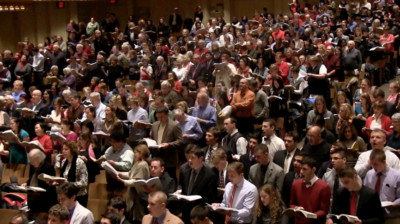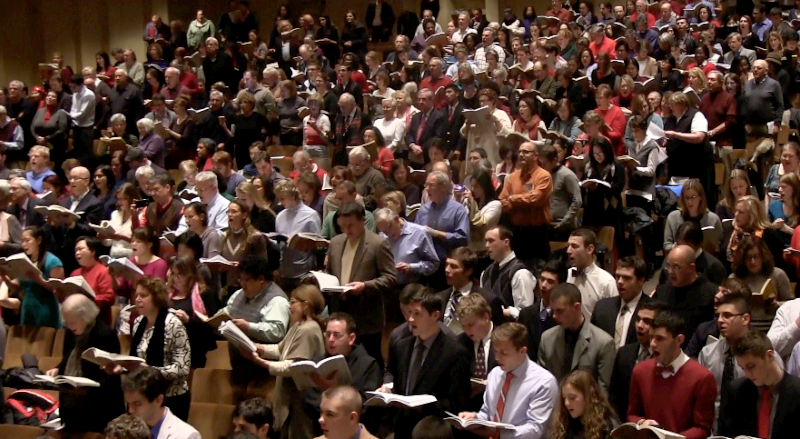INTERVIEW: National Chorale’s performance of Handel’s ‘Messiah’ is a bit different

At any performance of George Frideric Handel’s Messiah, there’s a lot of singing by a booming chorus and expert soloists with ranges that run from bass-baritone to soprano. When the National Chorale stages the classic Christmastime oratario, the booming chorus sounds a little louder.
That’s because National Chorale’s annual classical feast is a sing-in featuring an audience of nearly 3,000 providing their own voices for the iconic chorus parts. That’s a lot of “Hallejuahs” and “Glory to God in the highest,” but it’s all in an evening’s work for the National Chorale, the historic and well-respected choral company from New York City.
This year’s Messiah sing-in is set for Tuesday, Dec. 20 at 7:30 p.m. at David Geffen Hall at Lincoln Center. The usual home for the New York Philharmonic will welcome the company, under the leadership of artistic director Everett McCorvey. It will be the National Chorale’s 49th presentation of the 18th-century classic.
“We’ve done 48 of these, and we have families who have been here for all 48 performances,” McCorvey said recently in a phone interview. “People are making it a holiday tradition. … People coming from outside of New York will visit New York during this time, so that they can take in the Messiah sing-in and also take in other activities in New York. And so we try to get our dates out very early so that people can make their plans for coming to be a part of the event. … At the beginning of the performance, we ask people how many are attending it for the first time and the second time, the fifth time, the 30th time and the 40th time. It’s amazing to see the number of people who raise their hand, and so I think it’s a real family tradition. And it’s something that everybody can participate in. You have people who come to sing. You have people who come just to sit and be around singers, to listen to singers from the audience because it’s the entire audience that sings.”
McCorvey said David Geffen Hall, formerly known as Avery Fisher Hall, has beautiful acoustics that allow the thousands of voices to soar. In addition, the choral company will employ the help of soloists Eric Brenner, Roderick George, Kevin Maynor and Jessica Sandidge. That’s not it. The National Chorale also uses 17 conductors throughout the evening.
Everything is super sized for this Messiah.
“These are prominent conductors from the area, and we invite them to come and conduct from the stage,” McCorvey said. “The only people on the stage will be the conductors, and the organist will play. But the focus is really on the audience, and so each conductor, they have a minute to talk about their piece that they’re conducting. … So they all talk a little bit, give a little history about the number that they’re performing, and then they will conduct that number. It’s great because you have 17 different conducting styles. We hear some great stories. We hear different interpretations of the movements, and then the conductors conduct it. And we have some long-term conductors who have also been there for many, many years like Michael Spierman, who is the artistic director of the Bronx Opera and has a huge following.”
The National Chorale’s version of Messiah is slightly abridged — but only slightly. Almost all of the recognizable choruses are featured; however, some of the solo works are trimmed. McCorvey said the soloists stick mostly to the Christmas portion of the oratario. It’s a safe bet that audiences can expect the world-recognized “Hallelujah!” chorus, plus “And the glory of the Lord,” “His yoke is easy, His burden is light” and “Behold the Lamb of God.”
Because of the audience participation, the National Chorale attracts a diverse group of singers to David Geffen Hall. There are repeat customers who revel at the chance of standing and singing these familiar words, and those who are experiencing Messiah for the first time.
“I think one of the goals of all of us who are in the performing arts is to look out and see an audience that is diverse, not only in terms of racially diverse but in terms of age because the only way we’re going to survive in the business of performing arts is if we grow our audience members,” McCorvey said. “It’s great to look out and see children there who are experiencing it for the first time. … High school choirs will come and sing as well, and then you see adults. You see their grandparents. It’s a very, very diverse audience, and I think it’s something that all of us in the business would love to see every time we look out from the stage into the audience.”
McCorvey has had a long and varied career in music. He moved to New York in the 1980s as a freelance singer. He actually sang for five years for the National Chorale when it was under the direction of Martin Josman. He went on to earn a doctorate in music and became director of opera at the University of Kentucky.
One of his career highlights is founding the American Spiritual Ensemble, which is in its 21st year of singing spirituals for audiences. The ensemble has approximately 100 members, with a couple dozen singers traveling with McCorvey for engagements and tours.
“They’re professionals singers and professional opera singers,” McCorvey said of the American Spiritual Ensemble. “We have a very limited rehearsal time because they’re a professional group. We have to pull concerts together very quickly, and we do so and do them at a very high level. And one of the board members from the National Chorale had been following the American Spiritual Ensemble, and so when Martin became ill and they were looking for an interim director, this was about three years ago, she asked me if I would consider … which I was very honored to be able to do, especially since I sung with the group in the ‘80s. And when Martin died, they asked me to take over as the artistic director, and I have been very honored to do so. It’s an incredible group of 40 professional singers and orchestra, and our season at Lincoln Center is typically four concerts a year.”
After Messiah, the National Chorale will present Wolfgang Amadeus Mozart’s Requiem April 8 at David Geffen Hall. The performance will feature soloists Elizabeth de Trejo, Blythe Gaissert, Daniel Curran and Kenneth Overton. They have already presented a celebration of George Gershwin and Ludwig van Beethoven’s Symphony #9.
Right now, all eyes and ears are on Handel’s masterpiece. However, one of the beauties of a sing-in is that no real rehearsal time is needed.
“There is no rehearsal because the audience is the chorus,” McCorvey said. “I will rehearse with the soloists, but the audience comes there. They come with their scores. We encourage them to bring their scores. If they need to purchase scores, they can do so from our office, but most of the people who come, come with their scores. They come with friends. The National Chorale members will be strategically placed throughout the auditorium, and so they’re not on stage. The Chorale members are in the auditorium. We even have the National Chorale orchestra members who are going to come and sing. They will be strategically placed in the audience as well, so everybody is in the audience. And it’s focused on the audience. … I take the audience through some vocal warm-ups at the beginning of the concerts to get the voices all nice, and tuned and warmed up.”
By John Soltes / Publisher / John@HollywoodSoapbox.com
The National Chorale will present Handel’s Messiah Tuesday, Dec. 20 at 7:30 p.m. at David Geffen Hall at Lincoln Center in New York City. Click here for more information and tickets.

